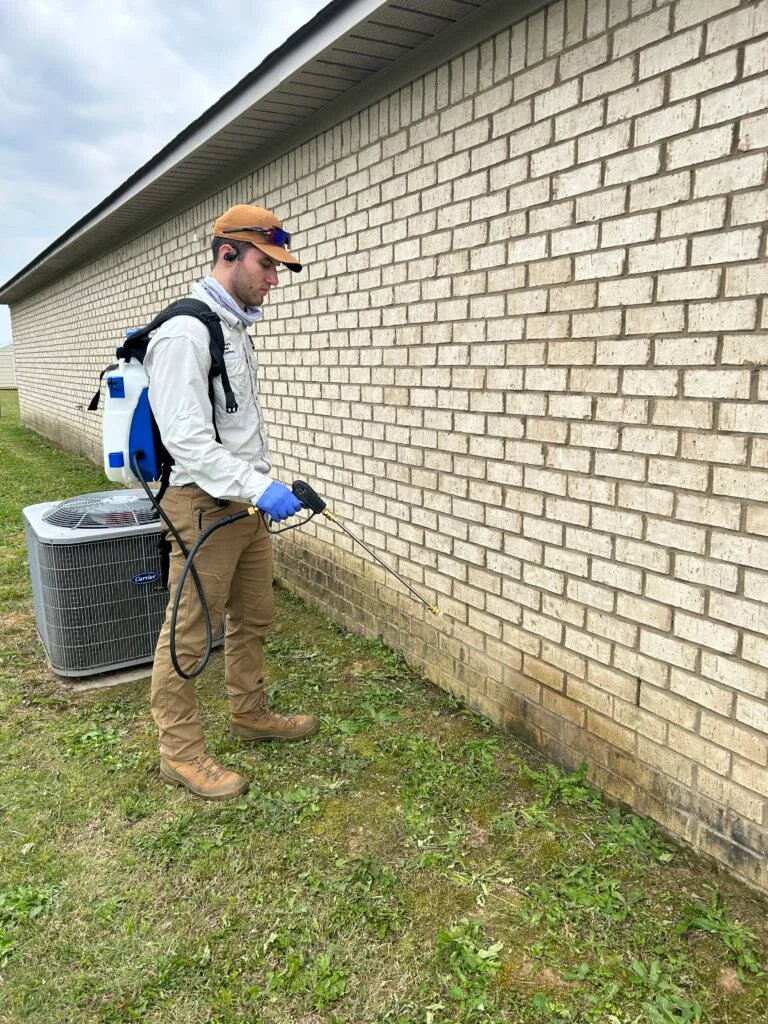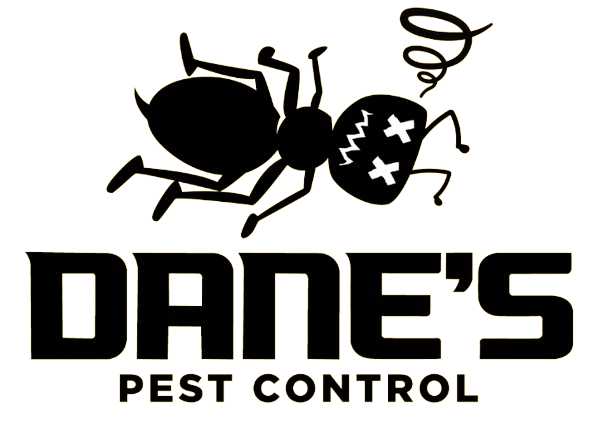Tick Control
Tick Control


Stop Ticks and 30+ Other Pests For As LOW AS $35 A Month !!
Stop Ticks and 30+ Other Pests For As LOW AS $35 A Month !!
- 30+ pests included
- Pest Free Warranty
- Fast Customer Service
- Huntsville Family owned and operated
Get a Free Online Quote
Get a Free Online Quote
Quarterly Pest Control Service
Stop Tick and 30+ other Pests
- Home dewebbing
- Entry point Treatment
- Foundation Treatment
- Interior Treatment
- Crack and Crevice Treatment
Pest Free Guarantee
Dane’s Pest Control

- Family Owned
- Honest Pricing
- Effective Solutions
- Fast Customer Service
Proudly Serving Huntsville and Surrounding Communities
Huntsville Entomology and Pest Expertise
Frequently Asked Questions
Find quick answers to common questions about our pest control services. Learn more about our methods, safety measures, and what to expect during treatment.
Is The Treatement Safe For Pets And Kids?
Yes! Everything is safe for pets and kids! We ask to please have dogs put away for 30 minutes after the service is complete.
How Long Does It Take Before The Ticks Are Gone?
1-3 days depending on the infestation
Do Ticks Come Back?
Yes! Ticks are one of the most common bugs in the United States. Even with Pest Control Ticks are constantly trying to find their way back to your home. This is why we return every 3 months to ensure your home is protected.
Billing Information
The service is performed quarterly and billed monthly. We require a debit/credit card to be put on file to be charged monthly.
Cash is accepted but customer must pay for 3 months if they want to pay in cash.
Get a Free Online Quote
What Our Customers Are Saying
EXCELLENTBased on 163 reviews Trustindex verifies that the original source of the review is Google.
Trustindex verifies that the original source of the review is Google. jerry mcnelley2024-09-04He did a good job he dust for cobwebs he sprayed for insects and he feel the rat baits upTrustindex verifies that the original source of the review is Google.
jerry mcnelley2024-09-04He did a good job he dust for cobwebs he sprayed for insects and he feel the rat baits upTrustindex verifies that the original source of the review is Google. Melissa Smith2024-09-04Ben Dane and his services have been absolutely amazing and if it wasn’t for me moving to another county I would have taken his business with me! Every time I call, he would answer his phone and 9 times out of 10 it was the same day service. Very kind and always explained in detail what to expect and not to expect! You wanna have a pest free home and save money doing it he’s the guy!!Trustindex verifies that the original source of the review is Google.
Melissa Smith2024-09-04Ben Dane and his services have been absolutely amazing and if it wasn’t for me moving to another county I would have taken his business with me! Every time I call, he would answer his phone and 9 times out of 10 it was the same day service. Very kind and always explained in detail what to expect and not to expect! You wanna have a pest free home and save money doing it he’s the guy!!Trustindex verifies that the original source of the review is Google. Jennifer Grant2024-08-30He was extremely nice and prompt and explained a lot thank you so very muchTrustindex verifies that the original source of the review is Google.
Jennifer Grant2024-08-30He was extremely nice and prompt and explained a lot thank you so very muchTrustindex verifies that the original source of the review is Google. Debbie Lee2024-08-26I had some ants and I texted Dane's. He immediately responded the next business day. I showed Issac where I had spotted the ants. He told me what he was going to do and why type of ants he thought they were (nomad ants..traveling through). He also treated around my hummingbird feeds which was really nice. Ants and bugs love the sweet nectar. Glad I made the switch.Trustindex verifies that the original source of the review is Google.
Debbie Lee2024-08-26I had some ants and I texted Dane's. He immediately responded the next business day. I showed Issac where I had spotted the ants. He told me what he was going to do and why type of ants he thought they were (nomad ants..traveling through). He also treated around my hummingbird feeds which was really nice. Ants and bugs love the sweet nectar. Glad I made the switch.Trustindex verifies that the original source of the review is Google. samuel aday2024-08-24MR. DANE COULD HAVE BEEN MORE THOROUGH AT THE JOB OF GETTING RID OF BED BUGS.Trustindex verifies that the original source of the review is Google.
samuel aday2024-08-24MR. DANE COULD HAVE BEEN MORE THOROUGH AT THE JOB OF GETTING RID OF BED BUGS.Trustindex verifies that the original source of the review is Google. Mrs. Jennifer Pyron2024-08-23He did a wonderful job, really good at his job, he explained everything that he was doing. He has very good people skills. On top of that he went to school with my daughter. And they got rid of the ants that were in my house. Thank you so much. I would recommend this company to everyone.Trustindex verifies that the original source of the review is Google.
Mrs. Jennifer Pyron2024-08-23He did a wonderful job, really good at his job, he explained everything that he was doing. He has very good people skills. On top of that he went to school with my daughter. And they got rid of the ants that were in my house. Thank you so much. I would recommend this company to everyone.Trustindex verifies that the original source of the review is Google. Clarissa2024-08-18Dane came out to my place after his normal business hours and I have to say, he was great. He was very honest and didn’t try to sell me on services that I didn’t need. He was real with me about what was going on and gave me solid advice on how to handle it. It’s refreshing to find someone who’s not just in it for the money but actually cares about doing a good job. If you need pest control, definitely reach out to Dane. Highly recommend!Trustindex verifies that the original source of the review is Google.
Clarissa2024-08-18Dane came out to my place after his normal business hours and I have to say, he was great. He was very honest and didn’t try to sell me on services that I didn’t need. He was real with me about what was going on and gave me solid advice on how to handle it. It’s refreshing to find someone who’s not just in it for the money but actually cares about doing a good job. If you need pest control, definitely reach out to Dane. Highly recommend!Trustindex verifies that the original source of the review is Google. Kaylee McAllister2024-08-15We started using Dane’s pest control the beginning of this year and so far we are very pleased! When shopping around, we found that he was one of the more reasonably priced companies. I love that it’s not a one lump sum, like others. Ben was very quick to reply back to my request for a quote and was very responsive when we were talking about our needs when it came to pest control. He’s texted me every time to let me know when hes coming bc I can never remember. We haven’t had to call him for any visits in between yet, but I have a feeling he would come in a very timely manner to spray inside as we only get it outside right now or just to spray again. We’ve used big name companies before and honestly just wasn’t too impressed so I love that we are supporting a locally owned company! I’d def recommend them and have to many of my friends! Check him out! At least get a quote and have a conversation especially if you’re shopping around!Trustindex verifies that the original source of the review is Google.
Kaylee McAllister2024-08-15We started using Dane’s pest control the beginning of this year and so far we are very pleased! When shopping around, we found that he was one of the more reasonably priced companies. I love that it’s not a one lump sum, like others. Ben was very quick to reply back to my request for a quote and was very responsive when we were talking about our needs when it came to pest control. He’s texted me every time to let me know when hes coming bc I can never remember. We haven’t had to call him for any visits in between yet, but I have a feeling he would come in a very timely manner to spray inside as we only get it outside right now or just to spray again. We’ve used big name companies before and honestly just wasn’t too impressed so I love that we are supporting a locally owned company! I’d def recommend them and have to many of my friends! Check him out! At least get a quote and have a conversation especially if you’re shopping around!Trustindex verifies that the original source of the review is Google. Maggie Burman2024-08-15I have been a customer since ending my xontract with a larger company. I have no regrets. Ben is knowledgeable, professional, keeps in communication with me, and is timely. Nothing but positive experiences!Trustindex verifies that the original source of the review is Google.
Maggie Burman2024-08-15I have been a customer since ending my xontract with a larger company. I have no regrets. Ben is knowledgeable, professional, keeps in communication with me, and is timely. Nothing but positive experiences!Trustindex verifies that the original source of the review is Google. Dayton Hasty2024-08-15We are so glad we found Dane's Pest Control! Ben is always very responsive and gets the job done efficiently. Since the treatments, we haven't had any sort of pest issue. Cannot recommend them enough!
Dayton Hasty2024-08-15We are so glad we found Dane's Pest Control! Ben is always very responsive and gets the job done efficiently. Since the treatments, we haven't had any sort of pest issue. Cannot recommend them enough!
Get rid of Ticks today by calling our Huntsville Ticks Experts
Call Us at 256 795-6590 or contact us online now!
Ticks are not only unsettling but also pose significant health risks in Huntsville. Bites from certain tick species can result in severe medical issues for humans and pets, thus fast action is recommended. With various types of ticks and diverse behaviors, these pests can be encountered both indoors and outdoors. If you are experiencing tick-related concerns, don’t hesitate to contact us today for effective solutions and professional assistance!
Ticks Species In Huntsville Alabama
Ticks in Huntsville Alabama
The tick population in Huntsville, Alabama, is a matter of concern due to its potential impact on both humans and pets. Ticks are resilient parasites, capable of surviving and thriving in various environments. After feeding on blood, ticks reproduce rapidly, laying numerous eggs that can hatch within a short span. The absence of wings doesn’t hinder their mobility; instead, ticks utilize their powerful legs to latch onto hosts or evade common extermination methods. Their ability to attach to hosts, coupled with the detachment and embedding of eggs in various surfaces, contributes to their persistent presence.
Huntsville’s climate, particularly during the warmer months, creates favorable conditions for ticks to flourish, especially in wooded areas and grassy landscapes. The risk of tick bites increases during outdoor activities, exposing individuals to potential tick-borne illnesses like Lyme disease and Rocky Mountain spotted fever. Preventive measures, such as wearing protective clothing and using tick repellent, are essential for minimizing the risks associated with tick encounters in Huntsville. Regular checks and prompt tick removal are crucial practices for maintaining a safe and healthy environment in the face of the tick population’s resilience and adaptability.
Diseases Caused by Ticks
Lyme Disease
Lyme disease, a potentially debilitating illness, is caused by the bacterium Borrelia burgdorferi, transmitted through the bite of infected black-legged ticks, commonly known as deer ticks. Huntsville residents and those in similar regions with a substantial tick population may be at risk. The symptoms of Lyme disease can vary, ranging from fever and fatigue to joint pain and neurological issues. If left untreated, Lyme disease can lead to more severe complications, affecting the heart, joints, and the nervous system. Early detection is crucial, as prompt antibiotic treatment in the initial stages can effectively eliminate the infection. Preventive measures such as wearing protective clothing, using tick repellent, and conducting thorough tick checks after outdoor activities are vital in minimizing the risk of Lyme disease in areas prone to tick infestations.
Rocky Mountain spotted fever (RMSF)
Rocky Mountain spotted fever (RMSF) is a potentially serious tick-borne illness caused by the bacterium Rickettsia rickettsii, primarily transmitted through the bite of infected American dog ticks, Rocky Mountain wood ticks, and brown dog ticks. While the disease is not limited to the Rocky Mountain region and can occur in various parts of the United States, including Huntsville, it remains a concern where ticks are prevalent. Symptoms of RMSF may include fever, headache, rash, and muscle aches, and if not treated promptly with antibiotics, it can lead to severe complications affecting vital organs. Residents in tick-prone areas should be vigilant about preventive measures, including wearing protective clothing, using tick repellent, and conducting thorough tick checks after outdoor activities, to reduce the risk of contracting Rocky Mountain spotted fever.
How to Prevent Ticks
- Use Tick Repellent: Apply an EPA-approved tick repellent on exposed skin and clothing before heading outdoors.
- Wear Protective Clothing: Dress in long sleeves, long pants, and tuck pants into socks or boots to minimize exposed skin.
- Choose Light-Colored Clothing: Opt for light-colored clothing to make it easier to spot ticks.
- Check for Ticks Regularly: Conduct thorough tick checks on yourself, children, and pets after spending time outdoors.
- Shower After Outdoor Activities: Take a shower within two hours of being outdoors to wash off ticks that may be crawling on your skin.
- Use Tick-Proof Landscaping: Create a tick-safe zone around your home by keeping lawns well-maintained and minimizing areas where ticks may thrive.
- Treat Pets for Ticks: Use tick prevention products on pets and check them regularly for ticks, as they can carry ticks indoors.
- Prompt Tick Removal: If you find a tick, use fine-tipped tweezers to grasp it as close to the skin’s surface as possible and pull upward with steady, even pressure. Clean the bite area and your hands with rubbing alcohol, an iodine scrub, or soap and water.
Where We Perform Tick Control
- Providence Alabama
- Athens Alabama
- Triana Alabama
- Brownsboro Alabama
- Gurely Alabama
- Moores Mill Alabama
- Triana Alabama
